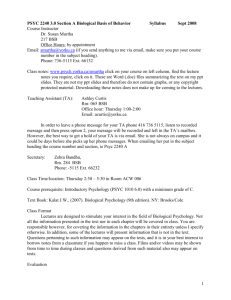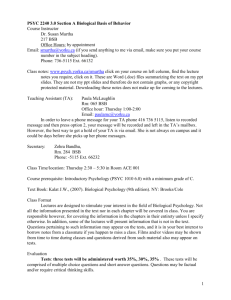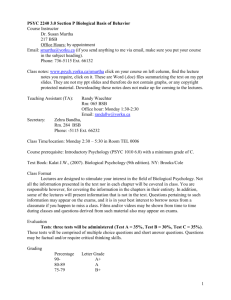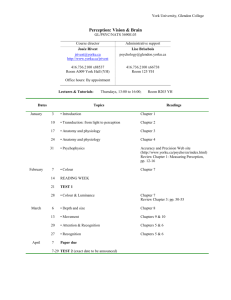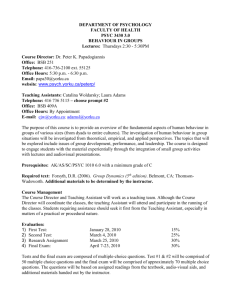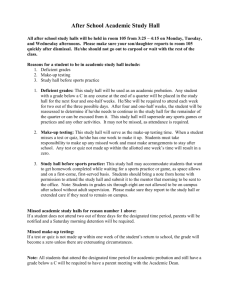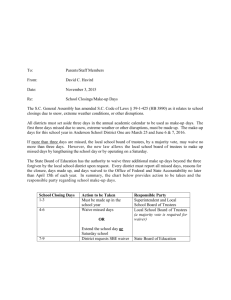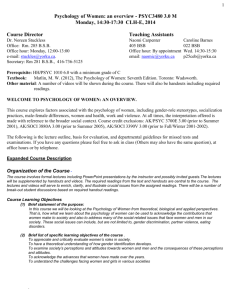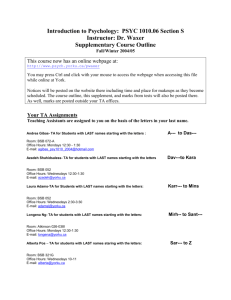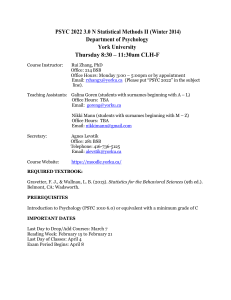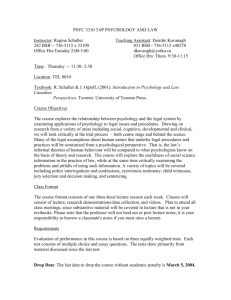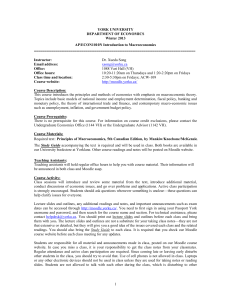2220.3 Perception
advertisement
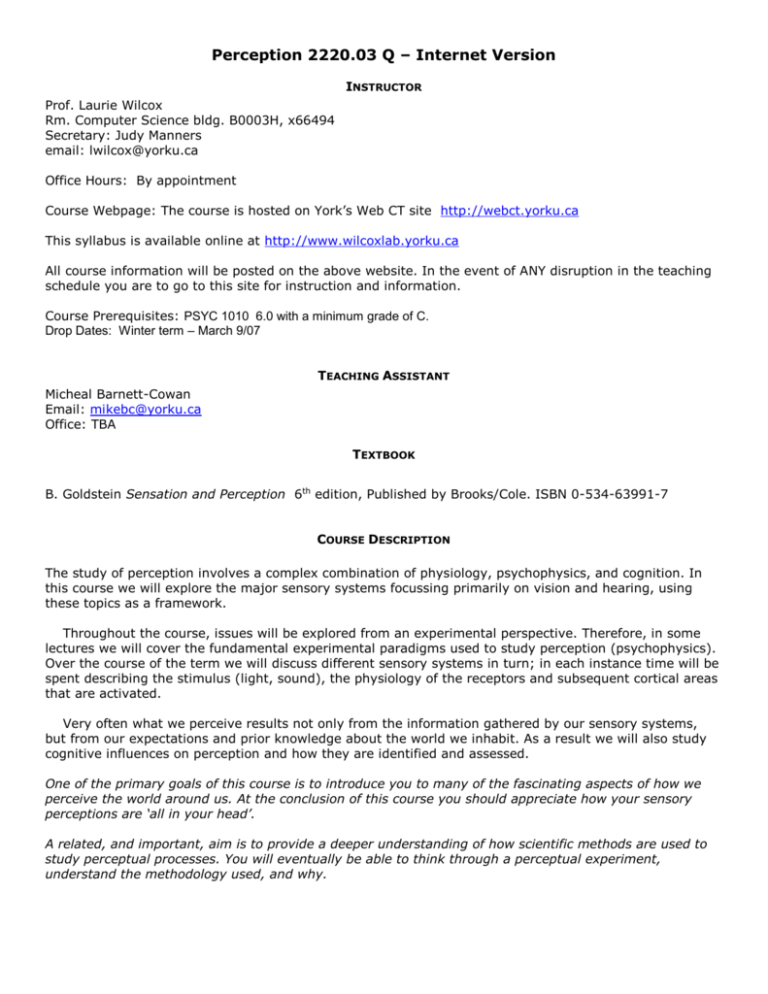
Perception 2220.03 Q – Internet Version INSTRUCTOR Prof. Laurie Wilcox Rm. Computer Science bldg. B0003H, x66494 Secretary: Judy Manners email: lwilcox@yorku.ca Office Hours: By appointment Course Webpage: The course is hosted on York’s Web CT site http://webct.yorku.ca This syllabus is available online at http://www.wilcoxlab.yorku.ca All course information will be posted on the above website. In the event of ANY disruption in the teaching schedule you are to go to this site for instruction and information. Course Prerequisites: PSYC 1010 6.0 with a minimum grade of C. Drop Dates: Winter term – March 9/07 TEACHING ASSISTANT Micheal Barnett-Cowan Email: mikebc@yorku.ca Office: TBA TEXTBOOK B. Goldstein Sensation and Perception 6th edition, Published by Brooks/Cole. ISBN 0-534-63991-7 COURSE DESCRIPTION The study of perception involves a complex combination of physiology, psychophysics, and cognition. In this course we will explore the major sensory systems focussing primarily on vision and hearing, using these topics as a framework. Throughout the course, issues will be explored from an experimental perspective. Therefore, in some lectures we will cover the fundamental experimental paradigms used to study perception (psychophysics). Over the course of the term we will discuss different sensory systems in turn; in each instance time will be spent describing the stimulus (light, sound), the physiology of the receptors and subsequent cortical areas that are activated. Very often what we perceive results not only from the information gathered by our sensory systems, but from our expectations and prior knowledge about the world we inhabit. As a result we will also study cognitive influences on perception and how they are identified and assessed. One of the primary goals of this course is to introduce you to many of the fascinating aspects of how we perceive the world around us. At the conclusion of this course you should appreciate how your sensory perceptions are ‘all in your head’. A related, and important, aim is to provide a deeper understanding of how scientific methods are used to study perceptual processes. You will eventually be able to think through a perceptual experiment, understand the methodology used, and why. COURSE EVALUATION 2 In-class tests: Final exam: Participation 55% 40% 5% (multiple choice - 27.5% each) (multiple choice & short answer) (Discussion Posting) The final exam will be held during the regular exam schedule and will be comprehensive. The tests will be based on the text, and all lectures, films or demos. Make-up exams will be scheduled for pre-assigned days and not on an individual basis. If you miss a test, or have a question about the marking of the midterm you should contact your TA immediately. S/he will require proof of illness or mishap in the case of a missed test or exam (see below for full details regarding the make-up policy). If you arrive late you will not be given extra time to complete the test. Given that this is an online course, the midterm(s) will be scheduled in the evening. We will deal with any scheduling conflicts on an individual basis, however, personal commitments will not be accommodated except in extreme circumstances. 2 TEST DATES Finalized test dates/times/locations will be provided as soon as possible 6th week (TBA) Test #1 Chapters 1-5 11/12th week (TBA) Test #2 Chapters 6-10 Final Exam During the regular exam schedule (no exceptions for vacation plans) and will be comprehensive (Chapters 1-11). The final exam will be held during the regular exam schedule and will be comprehensive. The tests will be based on the text, and all lectures, films or demos. Please refer to York University’s Religious Observance website for information regarding observed holidays and procedures: https://w2prod.sis.yorku.ca/Apps/WebObjects/cdm.woa/wa/regobs. COURSE SCHEDULE Date (Mondays) *January 3 Lecture 1 Chapter 1 *January 8 January 15 January 22 January 29 February 1 - 9 Midterm this week Date/Time/Location to be set by room allocations. February 12-16 February 19 February 26 March 5 March 12 March 19-23 Midterm this week Date/Time/Location to be set by room allocations. **March 26 1 2 3 4 1 2,3 4 5 TEST 1 Content Obtain Accounts Review Course Intro Vision High Level Vision Objects Chapters 1 -5 --------5 6 7 8 ------6 7 8, 9 10 Test 2 READING WEEK Colour Depth, Size Motion & action Auditory System Chapters 6-10 9 11 Hearing *Note The first lecture is available for 2 weeks to accommodate start-up problems. ** This chapter will be on the final exam, and will be given the same weighting as the other chapters. 3 MISSED EXAMS According to University Policy, the only legitimate excuse for missing an exam (i.e., one for which a make-up will be scheduled) is because of medical problems or exceptional circumstances. If you miss an exam, you must contact your teaching assistant, department (416-487-6738), or myself within 48 hours of the missed exam. If you do not speak to a person directly you must leave a message. Clearly state your name, student number, course, and a number/time at which you can be reached. If you are unable to contact someone during this 48 hour period, documentation accounting for the delay must be provided. Documentation verifying the reason for the missed exam (see below) must be provided either prior to or at the time of the make-up. Failure to provide appropriate documentation will result in a grade of 0 on the exam. A. Tests or examinations missed on the grounds of medical circumstances must be supported by an Attending Physician’s Statement or a Statement by a Psychologist or Counsellor. The Attending Physician’s Statement must include (I) the full name, mailing address and telephone number of the Physicians, (ii) state the nature of the illness and its duration (i.e., specific dates covered), and (iii) an indication of whether the illness and/or medication prescribed would have seriously affected your ability to study and perform over the period in question. B. Exams missed on the ground of exception non-medical circumstances must be supported by appropriate documentation, i.e., death certificates, obituary notice, automobile accident reports, airline/train/bus tickets/receipt for emergency travel (with date of booking on ticket), etc. Receipts from emergency travel must indicate destination, departure and return dates. In the case of the make up exam, you must be prepared to write within the week following the missed exam. Although the content to be examined will be the same, the format may or may not follow that of the original exam. It is your responsibility to check with myself or the TA as to the date/time of the makeup. A conflict in another course during the time of the make-up is not an acceptable reason for missing the make-up (unless there is an exam in that course at that time). There will be no second opportunity for a make-up. 4
